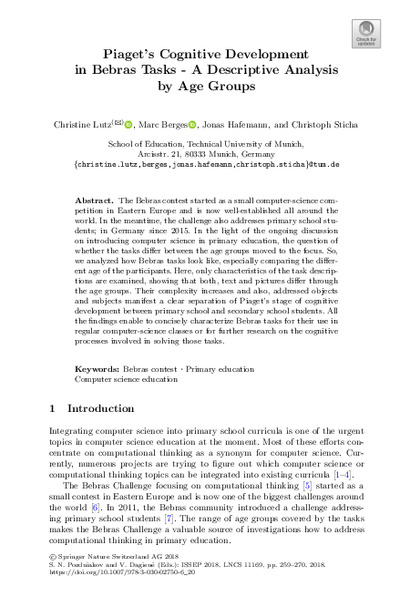Piaget’s Cognitive Development in Bebras Tasks - A Descriptive Analysis by Age GroupsZu finden in: Informatics in Schools: Fundamentals of Computer Science and Software Engineering (Seite 259 bis 270), 2018
  |
 |
 Diese Seite wurde seit 1 Jahr inhaltlich nicht mehr aktualisiert.
Unter Umständen ist sie nicht mehr aktuell.
Diese Seite wurde seit 1 Jahr inhaltlich nicht mehr aktualisiert.
Unter Umständen ist sie nicht mehr aktuell.
 Zusammenfassungen
Zusammenfassungen
 The Bebras contest started as a small computer-science competition in Eastern Europe and is now well-established all around the world. In the meantime, the challenge also addresses primary school students; in Germany since 2015. In the light of the ongoing discussion on introducing computer science in primary education, the question of whether the tasks differ between the age groups moved to the focus. So, we analyzed how Bebras tasks look like, especially comparing the different age of the participants. Here, only characteristics of the task descriptions are examined, showing that both, text and pictures differ through the age groups. Their complexity increases and also, addressed objects and subjects manifest a clear separation of Piaget’s stage of cognitive development between primary school and secondary school students. All the findings enable to concisely characterize Bebras tasks for their use in regular computer-science classes or for further research on the cognitive processes involved in solving those tasks.
The Bebras contest started as a small computer-science competition in Eastern Europe and is now well-established all around the world. In the meantime, the challenge also addresses primary school students; in Germany since 2015. In the light of the ongoing discussion on introducing computer science in primary education, the question of whether the tasks differ between the age groups moved to the focus. So, we analyzed how Bebras tasks look like, especially comparing the different age of the participants. Here, only characteristics of the task descriptions are examined, showing that both, text and pictures differ through the age groups. Their complexity increases and also, addressed objects and subjects manifest a clear separation of Piaget’s stage of cognitive development between primary school and secondary school students. All the findings enable to concisely characterize Bebras tasks for their use in regular computer-science classes or for further research on the cognitive processes involved in solving those tasks. Dieser wissenschaftliche Zeitschriftenartikel erwähnt ...
Dieser wissenschaftliche Zeitschriftenartikel erwähnt ...
 Personen KB IB clear | Peter K. Antonitsch , James Atlas , Tim Bell , Marc Berges , Valentina Dagiene , Caitlin Duncan , Gerald Futschek , Richard Gluga , Dorothee Graswald , Peter Hubwieser , Elena Hubwieser , Martina Kabátová , Judy Kay , Raymond Lister , Stefan Pasterk , Alexander Ruf , Barbara Sabitzer , Donna Teague , Monika Tomcsányiová | |||||||||||||||||||||||||||||||||||||||||||||||||||||||||||||||||||||||||||||||||
 Begriffe KB IB clear | cognitive load theory (CLT)
, Informatikcomputer science
, Informatik in der Primarschule
,  Primarschule (1-6) / Grundschule (1-4) Primarschule (1-6) / Grundschule (1-4) primary school
, primary school
,  Schule Schule school school
| |||||||||||||||||||||||||||||||||||||||||||||||||||||||||||||||||||||||||||||||||
 Bücher | ||||||||||||||||||||||||||||||||||||||||||||||||||||||||||||||||||||||||||||||||||
 Texte |
|
 Dieser wissenschaftliche Zeitschriftenartikel erwähnt vermutlich nicht ...
Dieser wissenschaftliche Zeitschriftenartikel erwähnt vermutlich nicht ... 
 Nicht erwähnte Begriffe | Informatik-Didaktik, Informatik-Unterricht (Fachinformatik), Informatikunterricht in der Schule, Kinder, LehrerIn, Unterricht |
 Tagcloud
Tagcloud
 Zitationsgraph
Zitationsgraph
 Zitationsgraph (Beta-Test mit vis.js)
Zitationsgraph (Beta-Test mit vis.js)
 Zeitleiste
Zeitleiste
 Anderswo finden
Anderswo finden
 Volltext dieses Dokuments
Volltext dieses Dokuments
 |  Piaget’s Cognitive Development in Bebras Tasks - A Descriptive Analysis by Age Groups: Artikel als Volltext @ Springer ( Piaget’s Cognitive Development in Bebras Tasks - A Descriptive Analysis by Age Groups: Artikel als Volltext @ Springer ( : :  , 743 kByte; , 743 kByte;  : :  ) ) |
 Anderswo suchen
Anderswo suchen 
 Beat und dieser wissenschaftliche Zeitschriftenartikel
Beat und dieser wissenschaftliche Zeitschriftenartikel
Beat hat Dieser wissenschaftliche Zeitschriftenartikel während seiner Zeit am Institut für Medien und Schule (IMS) ins Biblionetz aufgenommen. Beat besitzt kein physisches, aber ein digitales Exemplar. Eine digitale Version ist auf dem Internet verfügbar (s.o.). Es gibt bisher nur wenige Objekte im Biblionetz, die dieses Werk zitieren.
 Biblionetz-History
Biblionetz-History 
default1
default2
default3
default2
default3


















 QR-Code dieser Seite
QR-Code dieser Seite